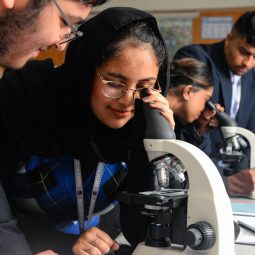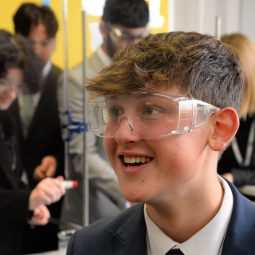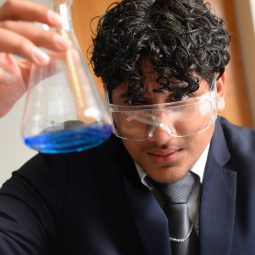Chemistry
Chemistry (OCR)
Chemistry deals with an atomic and molecular interpretation of the world around us. It is often called the ‘Central Science’ because it underpins all other branches of science. Chemistry ties together fundamental concepts from fields such as mathematics, physics, biology, engineering, medicine and environmental science and plays an important role in the development of technology and other forces that change our lives!
The course contains elements of the traditional areas of organic, inorganic and physical chemistry, along with a continuing process of assessment of practical skills.
Course Content & Assessment
Organic Chemistry
The content of organic chemistry revolves around the structure of molecules containing carbon, and the reactions thereof.
At the end of a Chemistry A-level, you will be able to recognise and draw chemical structures, determine the reactions that those molecules undergo, and design a synthetic route to produce a desired chemical product.
You will also be able to explain how reactions happen using reaction mechanisms, and how reactions can be complicated by factors such as isomerism.
Inorganic Chemistry
The content of inorganic chemistry largely concentrates on the reactions of elements, acids and transition metals.
After your A-level, you will be able to describe electronic structures of elements and compounds, and explain how these affect the structure, geometry and properties of substances.
You will be able to perform many different calculations including moles and acids, and you will be able to explain how buffer solutions maintain a pH balance.
Physical Chemistry
The content of physical chemistry is mainly mathematical and analytical.
At the end of the course, you will be able to explain how chemists analyse and identify substances using a combination of techniques such as NMR, and you will be able to calculate rates of reaction, and explain factors that affect it.
You will also be able to explain dynamic equilibrium, and how the chemical industry control reversible reactions.
The examinations for Chemistry take place in May and June.
The A-level is assessed in three exams at the end of the two years.
Along with an A-level grade, students can also be awarded a Practical Endorsement, by the development of practical skills through a core selection of experiments and investigations, as well as part of the examinations.
Teaching
In order to be a successful A-level chemist, you need to be highly organised and motivated from the beginning of the course.
The Chemistry department run independent study sessions every week, along with peer working groups.
Your Future
A Chemistry-based qualification gives you an excellent qualification for a wide career choice within science, industry or commerce.
A Chemistry qualification shows that you are numerate, analytical, and practical and have good problem solving, presentation and communication skills.
Jobs are to be found in small, medium and multinational chemical companies as well as in business, banking, accountancy, law, marketing, advertising, teaching, and the IT sector.
The Blue Coat Sixth Form is proud to be part of the Cranmer Education Trust
Cranmer Education Trust is a company limited by guarantee and an exempt charity registered in England. Company registration number: 07687709. Registered Office: Cranmer Education Trust, c/o The Blue Coat School, Egerton Street, Oldham OL1 3SQ. The website address is www.cranmereducationtrust.com and the phone number 0161 785 5082.









